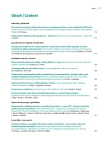Trimeresurus albolabris (white-lipped green pit viper) – bite report: case report
Authors:
František Nehaj 1; Marianna Kubašková 2; Michal Mokáň 1; Juraj Krivuš 1; Ivana Gomolová 1; František Kovář 1; Martin Jozef Péč 3; Marián Mokáň 1
Authors‘ workplace:
I. Interná klinika JLF UK a UN Martin, Slovenská republika
1; Rádiologická klinika JLF UK a UN Martin, Slovenská republika
2; JLF UK Martin, Slovenská republika
3
Published in:
Vnitř Lék 2018; 64(7-8): 802-806
Category:
Case Reports
Overview
Toxicology is a specialized scientific discipline, focusing on microbiological, botanical and animal venoms, poisons and toxins. This discipline includes more than just the chemistry and mode of action of a toxin, but also with the biology of venom or poison producing organism, the structure and function of the venom apparatus, as well as the use of the venom or poison. The discipline of toxicology involves the study of the poison on living organisms and the therapy of the intoxication. A genus Trimeresurus, to which belongs Green Pit Viper, is large and includes around 36 types. Snake venoms have various composition and they can effect cardiovascular and nervous system, kidneys, hemocoagulation, vessel wall and muscle cells. In this article, we are presenting a rare case report about Trimeresurus albolabris, review of literature and general treatment after intoxication with snake venom. Prompt assessment, observation and early specific management are the keys to treat intoxication with snake venom.
Key words:
hemotoxin – intoxication – snake venom – treatment – Trimeresurus albolabris
Sources
- Mattison C. Hadi. Ottovo nakladatelství: Praha 2001. ISBN 80–7181–478–4.
- Warrell DA. Bites of venomous snakes. N Engl J Med 2002; 347(22): 1804–1805. Dostupné z DOI: <http://dx.doi.org/10.1056/NEJM200211283472217>.
- Pochanugool C, Wildde H, Bhanganada K et al. Venomous snakebite in Thailand. II: Clinical experience. Mil Med 1998; 163(5): 318–323.
- Sokol J, Skerenova M, Jedinakova Z et al. Progress in the Understanding of Sticky Platelet Syndrome. Semin Thromb Hemost 2017; 43(1): 8–13. Dostupné z DOI: <http://dx.doi.org/10.1055/s-0036–1584352>.
- Sokol J, Biringer K, Skerenova M et al. Activity of coagulation factor XI in patients with spontaneous miscarriage: the presence of risk alleles. J Obstet Gynaecol 2015; 35(6): 621–624. Dostupné z DOI: <http://dx.doi.org/10.3109/01443615.2014.991284>.
- Simonova R, Bartosová L, Chudy P et al. Nine kindreds of familial sticky platelet syndrome phenotype. Clin Appl Thromb Hemost 2013; 19(4): 395–401. Dostupné z DOI: <http://dx.doi.org/10.1177/1076029612439340>.
- Lalloo DG, Theakston RD. Snake antivenoms. J Toxicol Clin Toxicol 2003; 41(3): 277–90; 317–27.
- Dumavibhat B, Visudhisphan S, Malasit P. Severe cases of Green Pit Viper snake venom poisoning. J Med Assoc Thai 1989; 72(10): 593–596.
- Cowles RA, Colleti LM. Presentation and treatment of venomous snakebites at a Nothern Academic Medical Center. Am Surg 2003; 69(5): 445–449.
- Nasu K, Ueda T, Miyakawa I. Intrauterine fetal death cause by Pit Viper venom poisoning in early pregnancy. Gynecol Obstet Incest 2004; 57(2): 114–116. Dostupné z DOI: <http://dx.doi.org/10.1159/000075676>.
- Barkagan ZS, Mamot AP, Glazunova GA et al. Effect of heparin on fibrinogern formation during experimental toxic syndrome of disseminated intravascular coagulation. Ukr Biokhim Zh (1978) 1988; 60(1): 23–29.
- Rojnuckarin P, Mahasandana S, Intragumthornchai T et al. Prognostic factors of Green Pit Vipers bites. Am J Trop Med Hyg 1998; 58(1): 22–25.
- Hutton RA, Looareesuwan S, Ho M et al. Arboreal Green Pit Vipers (genus Trimeresurus) of Southeast Asia: bites by T. albolabris and T. macrops in Thailand and review of the literature. Trans R Soc Trop Med Hyg 1990; 84(6): 866–874.
- Markland FS. Snake venoms and the hemostatic system. Toxicon 1998; 36(12): 1749–1800.
- Isbister GK, Williams V, Brown SG et al. [Australian Snakebite Project Investigators]. Clinically applicable laboratory end-points for treating snakebite coagulopathy. Pathology 2006; 38(6): 568–572.
- Tanos PP, Isbister GK, Lalloo DG et al. A model for venom-induced consumptive coagulopathy in snake bite. Toxicon 2008; 52(7): 769–780. Dostupné z DOI: <http://dx.doi.org/10.1016/j.toxicon.2008.08.013>.
- Paul V, Prahlad KA, Earali J et al. Trial of heparin in viper bites. J Assoc Physicians India 2003; 51 : 163–166.
- Sokol J, Biringer K, Skerenova M et al. Different models of inheritance in selected genes in patients with sticky platelet syndrome and fetal loss. Semin Thromb Hemost 2015; 41(3): 330–335. Dostupné z DOI: <http://dx.doi.org/10.1055/s-0034–1395351>.
- White J. Snake venoms and coagulopathy. Toxicon 2005; 45(8): 951–967. Dostupné z DOI: <http://dx.doi.org/10.1016/j.toxicon.2005.02.030>.
- Valenta J. Jedovatí hadi. Galén: Praha 2008. ISBN 9788072624737.
Labels
Diabetology Endocrinology Internal medicineArticle was published in
Internal Medicine

2018 Issue 7-8
-
All articles in this issue
- The Scottish model of vancomycin dosing and therapeutic drug monitoring improves both efficacy and safety of vancomycin therapy
- Mesenchymal stem cells and type 1 diabetes treatment
- How to diagnose cardiac sarcoidosis?
- Future of pharmacological treatment of non-alcoholic steatohepatitis in terms of key pathophysiological mechanisms
- Low-carbohydrate diet in diabetes mellitus treatment
- Controversies in the treatment of gout
- Endothelial function, its relation to arterial hypertension and the possibility of its modulation
- Myocardial injury after carbon monoxide intoxication in suicide attempt, with features of both toxic and tako-tsubo cardiomyopathy: case report
- Spironolactone in the treatment of hypertension: a neglected molecule
- Trimeresurus albolabris (white-lipped green pit viper) – bite report: case report
- Internal Medicine
- Journal archive
- Current issue
- Online only
- About the journal
Most read in this issue
- Low-carbohydrate diet in diabetes mellitus treatment
- Spironolactone in the treatment of hypertension: a neglected molecule
- Mesenchymal stem cells and type 1 diabetes treatment
- Controversies in the treatment of gout
